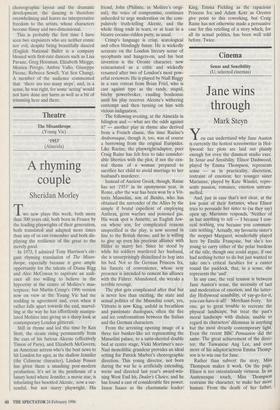Theatre
The Misanthrope (Young Vic)
'1953' (Almeida)
A rhyming couple
Sheridan Morley
Two new plays this week, both more than 300 years old, both born in France by the leading playwrights of their generation, both translated and adapted more times than any of us can remember and both dis- playing the resilience of the great to the merely good.
In 1973, I admired Tony Harrison's ele- gant rhyming translation of The Misan- thrope, especially because it gave ample opportunity for the talents of Diana Rigg and Alec McCowan to captivate an audi- ence all too willing to believe in the hypocrisy at the centre of Moliere's mas- terpiece; but Martin Crimp's 1996 version now on view at the Young Vic had me nodding in agreement and, even when it rather falls apart towards the end, marvel- ling at the way he has effortlessly manipu- lated Moliere into giving us a sharp look at contemporary London glitterati.
Still in rhyme and led this time by Ken Stott, the steam rising permanently from the ears of his furious Alceste (effectively Timon of Paris), and Elizabeth McGovern, an American actress who's the best news to hit London for ages, as the shallow Jennifer (the Celimene character), Lindsay Posner has given them a smashing post-modern production. It's set in the penthouse of a luxury hotel where Jennifer, a movie star, is infuriating her besotted Alceste, now a suc- cessful, but not starry playwright. His friend, John (Philinte, in Moliere's origi- nal), the voice of compromise, continues unheeded to urge moderation on the com- pulsively truth-telling Alceste, and the whole thing ends in tears, or at least in a bizarre cocaine-ridden party, as usual.
Crimp's language is crisp, scatological and often blindingly funny. He is wickedly accurate on the London literary scene of sycophants and hangers-on, and his best invention is the Oronte character, now reincarnated as a critic and wickedly renamed after two of London's most pow- erful reviewers. He is played by Niall Buggy in a rare retreat from Brian Friel, who is cast against type as the randy, stupid, bitchy powerbroker, exuding bonhomie until his play receives Alceste's withering contempt and then turning on him with vicious indignation.
The following evening, at the Almeida in Islington and — what are the odds against it? — another play in rhyme also derived from a French classic, this time Racine's Andromaque, though it, too, was of course a borrowing from the original Euripides. Like Racine, the playwright/adaptor, poet Craig Raine has felt free to take consider- able liberties with the plot, if not the cen- tral theme of a woman prepared to sacrifice her child to avoid marriage to her husband's murderer.
Instead of Ancient Greek, though, Raine has set '1953' in its eponymous year, in Rome, after the war has been won by a Vit- torio Mussolini, son of Benito, who has obtained the surrender of the Allies by the simple if brutal expedient of employing Anthrax, germ warfare and poisoned gas. His weak spot is Annette, an English Jew- ess whose son, for complicated reasons unspecified in the play, is now second in line to the British throne, and he is willing to give up even his precious alliance with Hitler to marry her. Since he stood by while his soldiers murdered her husband, she is unsurprisingly disinclined to hop into his bed. Not so the German Princess Ira, his fiancée of convenience, whose sexy presence is intended to cement his alliance with the Fiihrer. Abandoned, she wreaks a terrible revenge.
The plot gets complicated after that but is never less than exciting, the state and sexual politics of the Mussolini court, yes, Vittorio is now King, unfold in breathless and passionate duologues, often the fire and ice confrontations between the Italian and the German characters.
From the arresting opening image of a three tier bunker-like set representing the Mussolini palace, to a satin-sheeted double bed at centre stage, Vicki Mortimer's neo- Nazi monolithic grandeur provides an ideal setting for Patrick Marber's choreographic direction. This young director, not born during the war he is artificially extending, wrote and directed last year's award-win- ning West End hit, Dealer's Choice, and he has found a cast of considerable fire power. Jason Isaacs as the charismatic leader/ King, Emma Fielding as the rapacious Princess Ira and Adam Kotz as Orestes give point to this reworking, but Craig Raine has not otherwise made a persuasive case for this retelling of a story which, for all its sexual politics, has been well told before. Twice.


























































 Previous page
Previous page